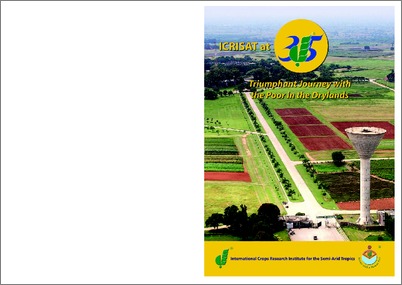ICRISAT at 35 Triumphant Journey with the Poor in the Drylands
Abstract
Five years ago, on the occasion of our 30th anniversary, we published ICRISAT’s first history book. This book was a chronicle of institutional memories – the early years of building up, the teething problems, the first set of challenges and the initial successes. Essentially, it captured the birth and growth of an institution with a noble mission to help stakeholders of semi-arid agriculture, especially the poor. As we commemorate ICRISAT’s 35th year, we have put up a sequel to the aforementioned book. This edition takes off from the first one and focuses on the four themes, which are the hallmarks of our achievements in the last 35 years: innovations, information, institutions and impact. I am most honored to mention that our 35-year journey in the semi-arid tropics has led to scientific triumphs that have vastly improved the lives of the poor. Moreover, national research and extension systems have been strengthened through our capacity building programs, research networks and innovative information sharing initiatives. As a global center of scientific excellence for dryland agriculture, ICRISAT is staffed with dedicated experts who have keenly studied the needs of poor farmers especially in Asia and sub-Saharan Africa. Let me emphasize we have not been alone in this journey. I am proud to acknowledge the unwavering support of our partners from various disciplines and sectors across the globe. Henceforth, ICRISAT further pursues its excellence and relevance by continuously striving to improve the livelihoods of the poor people of the semi-arid tropics. Over the last 35 years, we have recognized the vulnerability of poor farming communities in harsh and unyielding environments. As if semi-arid environments were not punishing in themselves, we find that the poorest of the poor are concentrated in the drylands. It is a vicious circle – dryland denizens are poor because the land is poor, and the land becomes poorer from continuous degradation and over farming, making the poor even poorer. Out of this, we are empowering dryland people to mitigate and adapt to emerging global challenges – climate change, desertification, drought, land degradation, loss of biodiversity, the aftermath of AIDS and wars, fuel shortages, and the ongoing and ever-present need for food. During the last 35 years, ICRISAT has indeed made a big difference. Consequently, ICRISAT is encouraged by its scientific triumphs as much as by the smiles of pride and joy brought to the faces of poor farm families in Asia and sub-Saharan Africa. I thank you for your interest in ICRISAT. I hope you enjoy reading about our history as Team ICRISAT, partners and stakeholders have enjoyed the journey of making it

